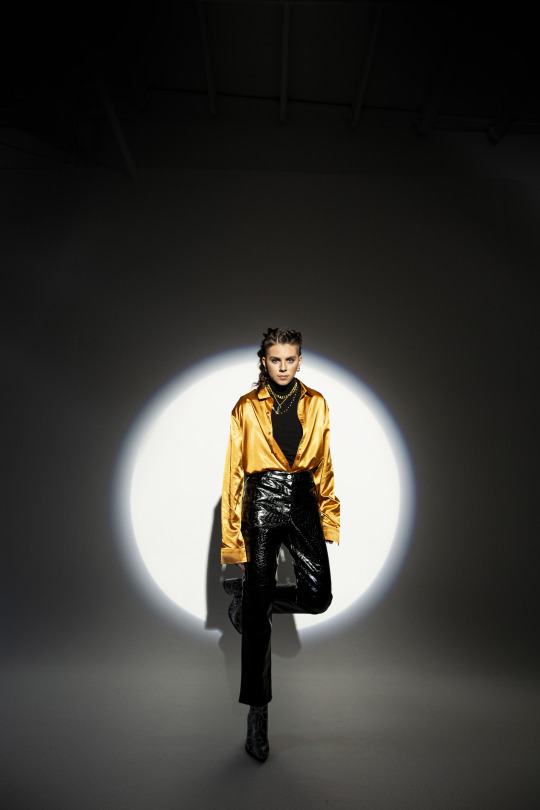#throughout her discography. I think loving art comes with being able to recognize where it fails
Text

Every Taylor Swift song
#I truly truly cannot empathize with anyone in limerence with her in fact it feels betraying.#all of the interesting beautiful art in the world and the only thing you can blow up is another implicitly conservative value white woman?#having to write narratives about her hypothetical dykeishness to feel comfortable with that dissonance? as if that would even absolve her#it’s not that I hate Taylor I just hate this unwillingness to engage with where her worldview has serious limitations and it seeps#throughout her discography. I think loving art comes with being able to recognize where it fails#what politics are present in it. it’s not deep it’s not subtext it’s all just right there
5K notes
·
View notes
Text
Lynn Gunn’s Honest Portrayal of PVRIS’ Past, Present and Future Plus Details on New LP ‘Use Me’ [Q&A]

Did you know that quicksand cannot really sink your entire body? Hollywood renditions of this frightening occurrence showcase “Indiana Jones” type heroes desperately reaching for a branch or a vine to evade being swallowed whole by the muddy foe. In real life, however, quicksand is much denser than the human body–namely your torso and lungs. So, although you may sink to some degree, you’ll only be engulfed to about your torso region. That being said, to escape the hold of this mucky captor, you’re called to utilize, not a vine or a stick, but a natural aspect of yourself–in this case, the buoyancy of your torso and lungs. Doing so allows you to adjust your positioning so that you are on your back and are therefore more easily able to free your legs and eventually, yourself.
During moments of crisis such as this, it is not often that we think to use what comes most natural to us in order to overcome difficulties. However, as PVRIS frontwomxn Lynn Gunn discovered, tuning into your natural inclinations can be exactly what sets you free.
After battling debilitating health issues, anxieties, and multiple album delays, the refreshingly new album Use Me is here, and it has the empowered LGBTQIA+ artist plastered all over it. From the distinctively raw lyrics, impassioned vocals, dexterous commixture of that classic PVRIS Alternative Rock and new-aged Glitch-pop, and even a 070 Shake feature, this new album is taking everything we thought we knew about PVRIS to much higher heights. Use Me serves as the first release since Gunn followed her heart and came forward as the sole architect behind PVRIS back in March. After listening to all 40 emotion-inducing minutes of this cinematic project, it becomes clear that Use Me is so much more than an album, it is an unapologetic reclamation of power.
We were able to speak with Lynn Gunn before the release of the album and gather her perspective on this new era of creativity, utilizing her natural abilities for this new project, and even on supporting social justice causes.
All quicksand jokes aside, sink into this interview with Lynn Gunn below:
Ones to Watch: Although you’ve been making music for quite some time, this new era seems to be of a new bloom, not only for PVRIS, but for you. As you have stated, PVRIS is still very much a collective, but you have decided to shed the skin of “band culture” and from it emerge as the sole vocalist, lyricists, and creative director of PVRIS. How has that transition been on you all? Are people taking to it the way that you imagined?
Lynn Gunn: I didn’t really imagine anyone taking it any way, to be honest, it’s happening regardless of what others want to say or feel about it. It’s felt great personally and as a unit. I’ve seen mostly support but obviously, with anything, there’s always going to be people with the opposite. At the end of the day, this is what this is moving forward and works best for us, I know my truth and what this journey has been and looked like so far. I’ve seen so many insane and comical theories and conspiracies about the transition/negative comments… but ultimately I think anyone who decides to wastes their energy like that might find their life to be much more enjoyable if they channeled that energy back into their own life as there’s clearly a lack/wound somewhere within themselves. If that seems sprinkled with “shade”, it is, but I mean that with the most sincerity as well.

The saying goes “you can never really outrun yourself”, and from White Noise to Use Me, it seems that you’ve left a bit of a breadcrumb-trail leading us to this point. Although PVRIS has primarily been recognized as an Alternative Rock “band”, we can hear tiny glimpses of the sound that best encompasses PVRIS now throughout your entire discography. Was this glitch-pop, disco-esque sound something you were intentionally experimenting within your previous projects?
To be honest, this is always where I imagined PVRIS’s sound living and the type of production I’d heard PVRIS songs being told through. I think in the past I didn’t fully know how to communicate the little production nuances that would have taken some tracks from point A to B, there was also a fear (that I now regret having) about straying from the “rock” production/experiencing rejection from the “scene” we initially started playing shows and touring in.
For the most part, and I truly mean this, there really isn’t that much of a difference in the instrumentation and sonic choices of this album from the first two, it’s still a very even play of organic instruments and electronic/synths, it’s just being produced through a different lens that’s a bit cleaner, crisper and crunchier in some areas. It’s a new interpretation of the woodwork that’s always been there.
What has kept you motivated to continue creating and sharing your truth with the world?
That’s a great question because I go back and forth with that feeling sometimes… Ultimately seeing comments from fans/listeners and hearing everyone’s stories and ways that they connect to PVRIS’s music is the most motivating thing in the world. I also feel that no matter what type of obstacle course the universe wants to throw me through, I’m always going to be grateful for the bruises/lessons and always going to feel compelled to create and share those truths through music.

I understand you’ve run into a deluge of unfortunate health issues the past few years that have affected you and the band greatly. If you feel comfortable sharing, could you talk a little bit about these illnesses and the ways you have had to overcome the obstacles they brought forth to get you to where you are now?
Totally comfortable sharing! I was diagnosed with an autoimmune disease called Ankylosing Spondylitis (AS) about two years ago and then about a year ago was diagnosed with Crohn’s disease. AS is an inflammatory disease that mainly attacks the lower back, hips, and ribs, but it can also manifest in a lot of other ways as well such as joint pain, chronic fatigue, and even eye issues. Sometimes when my AS is really bad, I can barely get out of bed or even roll over in bed. Over time, if not treated properly or managed, it can cause your vertebrae to fuse... I’ve heard that’s super rare though. Crohn’s is chronic inflammation in the digestive tract and is a little more embarrassing but pretty self-explanatory haha…
They definitely taught me (and by taught I mean forced me) to take time in caring for myself and caring for my body. Resting properly, staying in shape, eating super healthy, setting boundaries with work, etc. It’s also just made me really appreciative of the moments when my symptoms aren’t as bad/just happy to be alive and not have it worse. I’m determined to manage both diseases holistically and through integrative medicine, so far I’ve seen great progress.
Do you believe these difficulties aided in your journey towards this self-actualization that listeners are able to distinguish in this new era of PVRIS? If so, how/in what way?
Definitely! There are definitely some references to those difficulties in a few of the songs. I think outside of the music, it’s given a lot more self-love, strength, and patience. It’s also just created even more urgency to live my truth and to live it unapologetically in the way that I want, which naturally extends into PVRIS and the art that I want to make.
youtube
If you had to use one word to describe each album thus far, what words would you use and why?
White Noise - Freshman - everything was so new and exciting and there was so much eagerness with it, like a freshman walking through a high school for the first time haha.
All We Know of Heaven, All We Need of Hell - Bootcamp (haha) - creating it and touring it were both pretty hard experiences BUT incredibly strengthening.
USE ME - Upgrade - despite all the chaos around this release, this is the freest I’ve felt and the most confident I’ve felt about a PVRIS album.
All the visuals and music video treatments that you have conjured up have a strikingly symbolic and cinematic feel to them. However, the symbolism and tone of the music videos tied to Use Me seem to take on a different nature. Can you talk about this shift in creative expression?
Mostly just working with new collaborators (Yhellow, Katharine White and Griffin Stoddard). I feel a lot less precious about things (to a healthy degree) and much more open to letting others run with the concepts as they wish! So many fun new exciting perspectives have been able to shine through.
I know you are a film fanatic and dabble in cinematography. Do you have any staple films that influenced the creation of the last five music videos?
The Holy Mountain was a big influence for the “Hallucinations” video, as well as [for] “Old Wounds”. For “Dead Weight”, I was actually inspired by the opening credits to That 70’s Show and Saturday Night Fever haha.

In July, you announced that the album was being pushed back so as to allow the floor for the amplification of Black voices, and to generate events in support of Black Lives Matter. Do you believe artists have a responsibility to take steps such as these to create a better future, regardless of whether or not these issues directly affect them?
Absolutely. We all need to be educating ourselves and actively doing the work to demand and create change towards a future that’s equal and just for Black lives.
Fans have been clinging to the edges of their proverbial seats waiting for Use Me in spite of all of the justifiable album delays. If you could relay one message to all the fans who have been patiently waiting, what would it be?
Please enjoy/connect, be good to each other and please please please vote if you are able!
Who are your Ones to Watch?
DRAMA, Jax Anderson, HDBeenDope, Royal and The Serpent, Nikki Hayes, Kat Cunning and LEXXE!
23 notes
·
View notes
Text
From Pet Sounds to SMiLE: The 60s Defined with The Beach Boys
(Originally uploaded to my personal blog on Tungle, now hosted here for convenience).
This is an essay I wrote for one of my college classes during my fall semester, which I’ve neglected to share with others despite it being one of my personal favorite pieces I’ve written. It is the result of feverish nights spent reading articles, books, websites-- all of that-- trying to gather all the knowledge I can about The Beach Boys. Of course, as a result, there’s a lot of love poured into this.
Our prompt was to examine and analyze the American 60s through the work of a chosen artist, musician, writer, etc., of the time, while also incorporating an examination of an appropriate film. As a diehard Beach Boys fan, I felt as if it was my duty to talk about their legacy as “America’s Band,” and where that title truly comes from.
Apart from examining Pet Sounds and SMiLE (whose analyses in this essay are not as in-depth as I’d like, but I’d like to keep this vanilla/unaltered version for my future reference), I also look at some of their earlier discography and provide a brief blurb about Bill Pohlad’s 2014 film, Love and Mercy. Amongst all of this Beach Boys nonsense, I insert some quips about historical events that occur within the 60s, however, it’s still not to the lengths I’d like to write about :(
Anyway, please enjoy and let me know what you think. The essay is under the read more.
From Pet Sounds to SMiLE: The 60s Defined
Highs and lows marcate great, enthralling dramas. Surrounding every great drama is reverence, nostalgia, and critical analysis. The 60s, in this regard, is a great drama, forever cemented in the American psyche as a dreamland of innovative music, free love, drugs and expansions; yet also a hellish landscape of violence, strife, and trepidation. Amongst this music sits The Beach Boys: the pioneers of popular surf rock, the American competition to The Beatles, the creators of the first concept album, and the chaotic family. The Beach Boys as “America’s band” is a title they fought for through Pet Sounds (1966) and SMiLE (unreleased, 1967), encapsulating what made the 60s into the beautifully volatile era that still reverberates within the America of today.
In the early 60s, The Beach Boys revered the sun and an almost utopian California in their music, reflecting the era’s need to escape from the uncertainty that sprawled before itself. Leisure culture was rapidly expanding– cars were becoming more accessible, the West Coast found itself fiercely gripped by surf, the beach became a safe haven, and rock ‘n roll found a place in the hearts of many. It is here where The Beach Boys found their most commercial voice. In songs like “Fun, Fun, Fun,” The Beach Boys sing about a girl taking her car out to have some of that aforementioned fun, fun, fun. In “Little Deuce Coupe,” it’s all about talking about how cool cars are. And, in one of their most well-known songs (which is just Chuck Berry’s “Sweet Little Sixteen”), “Surfin’ USA,” they sing about the magical sport of surf and how it will bring together the entire United States, despite most of it having no access to a beach. These songs all reflect that same leisure culture and its greatness, yet, not all of their songs from that time just stagnate in some sort of happy, fun, and oblivious dream.
Brian Wilson, the founder, songwriter, and producer of The Beach Boys, had another message to put out into the world that echoed what he felt, and what the rest of America felt but wasn’t able to express entirely with words. Songs like “The Lonely Sea,” “In My Room,” and most remarkably, “The Warmth of the Sun,” echo a terrible loneliness and introversion that America found itself embroiled in. “The Lonely Sea” describes the sea as it constantly changes, never permanent or staying– although it primarily focuses itself on the topic of an uncertain romance, it is the romantic narrative of America from the 50s that is changing. It reflects the rapidly changing landscape of civil rights, politics, and war that emerged in the early 60s. With “In My Room,” Brian retreats into his room, a place where he feels safe, secure, and set away from the world around him– a topic previously unexplored in music of that time, accompanied with the lush harmonies that The Beach Boys are so fondly known by. He, and the rest of America’s teenagers retreat from the changing world around them, and in “The Warmth of the Sun,” these sentiments are turned into intense clinging to what good is left in the world– most plainly, the warmth of the sun. The song was written in response to JFK’s assassination, and reflects the sheer panic that America was faced with– only in clinging to the good could they prevail as conflict in Vietnam escalated into war. The Beach Boys, and the rest of America, continued to retreat further into themselves and sought respite through whatever means necessary.
As the Gulf of Tonkin resolution is passed, the 60s takes a sharp turn into the psychedelic as anxiety and fear wildly scatters itself about, reflected in The Beach Boys’s magnum opus, Pet Sounds (1966). Apart from the American invasion into Vietnam, The British Invasion has begun with the Beatles playing on the Ed Sullivan show and garnering a massive swarm of crazed fans. In 1965, they release Rubber Soul, pushing what pop music was, which Brian Wilson found himself challenged by. Following a panic attack on a plane from a live show, Brian promises to retire from touring entirely, and focuses his efforts on creating the best pop and rock album of all time.
Brian looks deeply into himself to find what he, and the rest of America yearns for– good times in the face of the violently bad; a return to romance. Yet, he could not ignore what else was brewing within him and America as well– turmoil, fear, terror, and resignment. He did not achieve this through introspection alone– with the help of psychedelic and hallucinogenic drugs that took the youth of America by storm, he was able to expand his mind and the scope of what music was. He turned his feelings into grandiose instrumentation, and took those instruments into a studio, and in turn, made the studio into an instrument as he produced and wrote the entirety of Pet Sounds by himself. Brian Wilson, at 23 years old, created the first ever concept album– an album for only listening. A narrative of a love that falls apart that is littered with self-doubt, worry, desperation, and a keen sense of pure innocence. A work of art.
The album’s opener is The Beach Boys’s most popular song, “Wouldn’t It Be Nice,” a relatively cheerful song about running away with your love from a society that refuses to accept that same love– a feeling that hit home for the slowly growing LGBT community in the 60s, but also for the America that wants to escape. In “I Know There’s An Answer,” Brian (following an acid trip) sings about people who are close-minded and yearns to know exactly why they’re the way that they are– echoing the counterculture’s questioning of the status quo through its exploration of sexuality, spirituality, and mainly drugs. Through “I Just Wasn’t Made For These Times,” he speaks of how he doesn’t feel like he has a place in the world, isolated, confused, and almost defeated– again, previously unexplored topics in music before its release. In the album’s closing track, “Caroline, No,” the unnamed, hypothetical girl that Brian Wilson sings about (and to) through the album’s run is described to have changed so much that he cannot even recognize her, and he questions whether or not things may ever return to normal– these sentiments are sent off with a train whirring past as dogs bark amongst the cacophony.
These ideas bleed throughout the 60s and its constant evolution back then and today– will things ever return back to normal? Although the counterculture that The Beach Boys are attempting to embrace is pushing what that normal is– will that constant change ever cease? Will there ever be a time where The Beach Boys, and effectively, America, feel safe?
In the creation of the unreleased 1967 album SMiLE, The Beach Boys attempted to define what America is in order to preserve whatever of it they could save, and its collapse echoed the collapse of the 60s’ beloved fervor and wild personality. The 60s’ ideals of peace, love, and connection are kicking into high gear in the escalation of the conflict in Vietnam.
These great ambitions are shared by Brian Wilson, who aspires to meet the outrageous expectations that came with the release of Pet Sounds, and he clamors to put together material for the album– his “teenage symphony to God.” He smokes weed and drops acid time and time again. He competes with himself and his band. He comes to the realization that he can tell the story of America with music.
Emboldened, Brian heads to the recording studio and records, records, records. He creates bits and fragments of instrumentation that, when eventually combined, are to create “mini-symphonies” that each carry their own distinctly American narratives– like reaching Plymouth Rock (“Do You Like Worms?”), the genocide of the Native Americans at the hands of colonists (“Heroes and Villains”), the building of the transcontinental railroad (“Cabinessence”), and the Chicago fire’s blazen destruction (“Mrs. O’Leary’s Cow”). Amongst those narratives lies themes of innocence, wellness, and unfettered energy.
The aforementioned themes come together in pop music’s greatest and most expensive song ever created: “Good Vibrations,” the last No.1 hit from The Beach Boys that was supposed to be SMiLE’s greatest hit. It’s an electrifying single that features the innovative use of a theremin, wildly piercing triplets on the cello, genuine musical movements, the voices of The Boys in sheer celebration, and one of two songs that shows Brian’s fully realized talent.
“Surf’s Up,” in that regard, is the other display of Brian’s fully realized talent. It is a dramatic and evocative symphony that recounts a spiritual awakening, resignment, and an unanswered hope for innocence’s return.
If “Good Vibrations” is the 60s the America remembers through rose-tinted glasses– an era of love, passion, peace, celebration, and innovation– then “Surf’s Up,” the soul of SMiLE, is the 60s America sees without those glasses– an era where a collective aspiration was to cling onto a form that was rapidly deteriorating before the eyes of the public.
SMiLE’s collapse, following tensions regarding management, excessive drug consumption, Carl Wilson’s (the youngest Wilson brother) draft evasion, and heavy expectations, is a representation of that 60s aspiration’s collapse. It is from Pet Sounds where the 60s expresses its uncertainty and fear, and it is through the absence of SMiLE where the 60s falls apart and leaves America wondering if it will ever return.
In the 2014 biopic Love and Mercy (dir. Bill Pohlad), this saga is explored through a younger Brian Wilson (played by Paul Dano) who represents The Beach Boys in the 60s, and an older Brian Wilson (played by John Cusack) who represents The Beach Boys beyond the 60s. Dano is energetic, troubled, creative, and impulsive. Cusack, on the other hand, is a shell, weathered, depressed, and traumatized– it is a drama of Brian’s psyche that echoes the drama of two differing accounts of the 60s that makes The Beach Boys’s story, and in turn, the 60s so palatable, compelling, and relevant to this day.
Brian Wilson, with SMiLE, you aspired to define America. Yet, it is with your Pet Sounds and SMiLE that The Beach Boys became “America’s band”, and that 60s America is defined as a dreamland and hellscape; a drama. A drama that lingers, ghosting about, crafting America into a world forever changed by the 60s that dared to see the country’s innocence protected and preserved.
2 notes
·
View notes